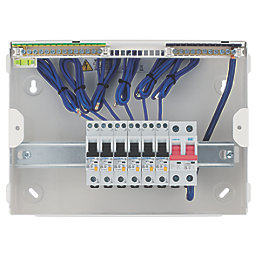Why Updating to Advanced RCBO CONSUMER UNITS is Vital for Safety
Why Updating to Advanced RCBO CONSUMER UNITS is Vital for Safety
Blog Article
The Duty of Customer Devices in Reliable Power Administration Solution
Consumer units are indispensable to efficient energy management systems, serving as the main distribution factors for electric power within structures. The advent of wise innovations has actually even more improved their capability, enabling for real-time information monitoring and nuanced energy intake analysis.
Recognizing Consumer Systems

Recognizing the role of customer systems begins with acknowledging their important feature in guarding electric systems. By isolating faults within certain circuits, consumer devices protect against prevalent blackouts and prospective fire threats. This isolation is attained with using circuit breakers that journey or integrates that blow when a mistake is detected, thereby reducing off the electric circulation to the impacted circuit.
Additionally, customer devices assist in the organized distribution of power, boosting the performance of energy use. They enable for the methodical administration of electrical loads, which can be specifically vital in industrial and commercial settings where demand can rise and fall significantly. Properly conserved consumer units contribute to the longevity of electrical systems and assist in minimizing downtime created by electric failings, inevitably supporting the seamless operation of energy-dependent facilities.
Smart Technologies Integration

A key advantage of wise customer systems is their capacity to leverage progressed formulas and maker learning for anticipating analytics. This permits preemptive modifications based upon usage patterns, weather condition forecasts, and other variables, considerably boosting overall effectiveness. Smart customer devices facilitate demand action programs, where energy use can be dynamically changed during height periods to stabilize the grid and minimize costs.
The assimilation of renewable resource sources, such as solar and wind, is likewise structured with wise consumer units. By intelligently managing the intermittency of these sources, these devices guarantee a well balanced and dependable power supply. Additionally, wise consumer devices boost customer engagement by giving thorough insights and remote capacities with mobile applications, fostering a more positive approach to energy preservation and sustainability.
Surveillance Energy Intake
Structure on the capabilities of smart technologies assimilation, checking power intake ends up being a critical focus within power monitoring systems. Effective tracking acts as the foundation for identifying energy ineffectiveness and executing rehabilitative measures. By leveraging innovative metering framework (AMI), real-time data on energy usage can be gathered at granular degrees, giving beneficial insights right into intake patterns and peak demand durations. This data-centric approach allows both customers and power managers to make enlightened decisions aimed at lowering waste and improving overall effectiveness.
Smart meters and Internet of Things (IoT) devices play an essential duty in this surveillance procedure. These gadgets can track energy use in real-time, transferring data to centralized systems for analysis. The gathered information is then processed through innovative algorithms to discover anomalies, anticipate future usage, and suggest optimization approaches. Furthermore, cloud-based options offer scalable systems for keeping and analyzing big datasets, helping with remote monitoring and control.
The integration of click over here now these innovations not only empowers consumers with comprehensive details concerning their energy usage yet likewise sustains energy carriers in taking care of lots circulation better. Inevitably, continual and specific surveillance is vital for attaining power performance, price financial savings, and sustainability goals within power administration systems.
Optimizing Home Appliance Use
-1796-p.jpg?v=293b7e83-9afe-44ed-b26f-caca2c71d6f2)
One efficient method includes identifying top and off-peak hours to change energy-intensive tasks, such as laundry or dishwashing, to times when power demand is reduced. This not only reduces stress on the grid yet additionally maximizes lower power tariffs. In addition, integrating maker discovering algorithms enables anticipating upkeep, ensuring devices run at optimum efficiency and extending their lifespan.
Energy management systems can additionally include user-specific preferences and behaviors to tailor home appliance usage timetables. For instance, clever illumination systems can change illumination based on tenancy and all-natural light availability, while a/c systems can maintain comfort degrees without too much power usage.
Supporting Sustainability
Promoting sustainability within Extra resources energy administration systems involves not just improving effectiveness yet additionally fostering eco accountable techniques. Consumer units are important to this process, as they give real-time information and control mechanisms that allow customers to keep an eye on and lower their power usage. By leveraging sophisticated innovations, consumer units can determine energy-saving possibilities and facilitate the integration of renewable resource sources like solar and wind power.
One critical aspect of promoting sustainability is enlightening customers on the benefits of responsible energy usage. Via in-depth understandings provided by customer units, individuals can make enlightened choices that minimize their carbon impact. For example, these units can suggest optimum times for running high-energy devices based on grid demand and renewable resource schedule, therefore decreasing dependence on nonrenewable fuel sources.
In addition, consumer devices sustain the fostering of clever grid technologies, which enhance the total effectiveness and dependability of power distribution. By making it possible for two-way communication between consumers and utility providers, these systems can dynamically change to power demands, reducing waste and promoting using sustainable energy methods.
Conclusion
Consumer devices, as essential components of power administration systems, considerably improve electric security and efficiency within structures through circuit protection and smart technology assimilation. Furthermore, the consolidation of sustainable power sources promotes sustainable practices, contributing to lowered general power usage and lower carbon footprints.
Advances in smart modern technologies have actually reinvented the capacities of energy monitoring systems, specifically with the assimilation of wise consumer systems.Building on the capabilities of clever innovations integration, keeping an eye on power consumption comes to be an essential emphasis within power administration systems.Reliable home appliance usage optimization is an important part of power administration systems, aiming to enhance performance and reduce unnecessary energy consumption.Customer devices, as important components of power administration systems, significantly boost electric safety and YOURURL.com efficiency within buildings with circuit protection and clever modern technology combination. In addition, the incorporation of renewable energy sources advertises sustainable methods, adding to decreased general energy consumption and lower carbon footprints.
Report this page